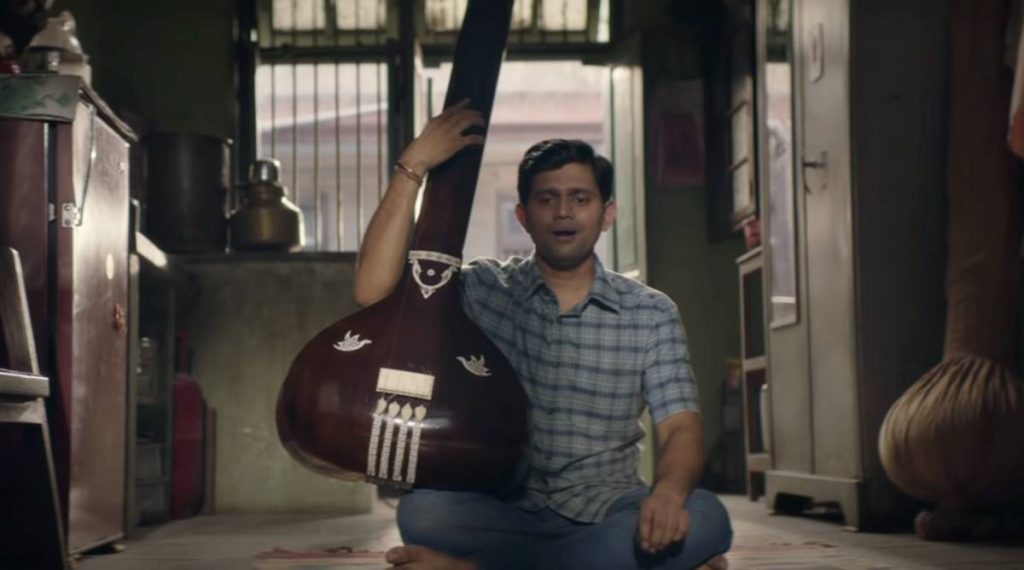Minimal in form, rich in detail, and unsparing in its verdict, Tamhane’s telling of the tale gently but firmly peels off the layers that reveal both the extent of the disciple’s idealism, and the futility of the aspirations that it has instilled in him.
The film, streaming on Netflix from today, opens to a classical music performance in progress. The setting is unglamorous. A spartan audience seated in a small performance space, mostly a classroom in a middling school building. A few people stand near the doorway, ready to bring more chairs or perform other clerical duties if beckoned. Other than the sonorous rendition of the singer immersed in his Khayal, nothing stands out. Amidst this unspectacular scenery, the camera slowly but surely zeroes in on the performers, seeking the subject of its interest. The elderly classical singer is clearly the leader of the band. But you realise, the story is about someone else; the disciple, seated behind him.
Chaitanya Tamhane’s The Disciple is a relentless exploration of an aspirational classical singer, played with incredible prudence by Aditya Modak. His Sharad Nerulkar has an idealistic view of his aspiration to be a music maestro. He is present in every scene of the film from the first shot to the last, often performing or practising his music, but always surrounded by it. The intimacy leaves little space for anything else in his life, it fills him up so much. Minimal in form, rich in detail, and unsparing in its verdict, Tamhane’s telling of the tale gently but firmly peels off the layers that reveal both the extent of his idealism, and the futility of the aspirations that it has instilled in him.
Tamhane uses both – the presence of the Khayal renditions and their absence to masterful effect. Every performance of Sharad starts off like a showcase of his talent; your lack of knowledge of the music lets you believe that this performance will be the breakout one of his career. Instead, each one is a small but meaningful indictment of the lack of his talent, his inability to reach the heights of the greats he admires. Be it losing an amateur contest, to his guru (Arun David) correcting him during practice, to his colleagues giving a better performance during a live event. But nothing shows the impotency of his aspiration more than the scenes that silently show him masturbating to porn on lonely nights, the sounds of visceral passion a shocking contrast to the pureness of the ragas he seeks.
A lot of his idealism is influenced by the mythical Maai, a renowned classical singer. We never see her; we only hear her firm voice as she opines on what it means to be a true guru and a true student of the ragas. There is no record of her performances, save one set that his father has passed on to him. This collectible and its profound contents are the only thing in Sharad’s life that that no one else has. He latches on to it and builds his life around it. Time seems to stop as he listens to her teachings, the lonely roads of late night Mumbai slowly running away as he rides his motorbike and listens to her speak. The voice over, done by filmmaker Sumitra Bhave, who passed away recently, is hypnotic and you realise why it binds him in a spell. It is symbolic when we are told that no one has heard of her; her aloofness that was oft understood as exclusivity could well have been a case of no takers for her music. The shattering of his belief system is silent, but the impact is profound. It is a coming of age moment. He goes from wanting to be a singer to being someone who makes money from it, a teacher, a paid performer, a music producer. They are the very things she spoke against.
The large swathes of the film when the Khayals take centre stage hold little meaning to most people like me, who do not have the knowledge or the ears to understand what, if any, story is unfolding in the singing and the music. But there is no doubt on how the scenes in between are constructed. Bit by bit, dialogue by dialogue, we sense the increasing tragedy of Sharad’s shattering dreams. Maai and his guru may have prepared him for a life of struggle, but not of failure. The serenity of his acceptance is the final nail in the coffin; he grows a gut as he ages, but has no stomach to fight for what he wants. The writing is clinical. The settings even more so, small and modest spaces of his residence, his guru ji’s chawl and the performances he goes to. The Mumbai of the middle class, who never rise above their survival, is as much a character in the film as anything else.
The Disciple is the story of the silent deconstruction of a dream, and the sadness of the story is overwhelming. But it has less to do with the tale itself, and much more to do with the exquisite telling of it.
Drama, Marathi, Color
Hindi, Drama, Color



I liked the review.